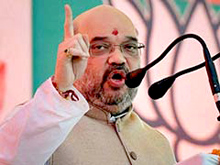Chennai/Hyderabad, Dec 21: As a controversy over forced religious conversions by some Sangh Parivar outfits raged, the BJP and the Government today put the onus on the opposition parties for bringing an anti-conversion law for which they were ready.
BJP President Amit Shah said government is ready to bring an anti-conversion law and dared the "so-called secular" opposition parties to support it while Union Minister Venkaiah Naidu said the opposition did not respond positively to this offer.
The comments by Shah and Naidu came a day after RSS chief Mohan Bhagwat strongly defended the current controversial campaign of the Sangh Parivar and dared the opposition to support a law banning religious conversions.
Shah asserted that such incidents would not derail the BJP-led NDA Government from its development agenda.
"BJP has made its stand clear on conversions. And no one can derail the party (government) from its development agenda," he told a press conference in Chennai.
He was replying to a question whether the campaign by some fringe groups on the conversion issue would affect the development agenda of the Narendra Modi Government.
Asked repeatedly about the involvement of RSS in the matter, Shah evaded a direct reply and said, "RSS is a nationalist organisation and I have no doubt over this."
Opposition parties have been seeking to corner the government on the 'ghar wapsi' campaign in parts of North India and stalled proceedings in Rajya Sabha demanding a statement from Modi.
Shah, who is on a two-day visit to Chennai since yesterday, also said BJP's stand on forced conversions was clear and the government was ready to bring a law to ban them.
"BJP is clear about its stand on forced conversions. Parliamentary Affairs Minister Venkaiah Naidu has said in Parliament that the government is ready to bring in a law against forced conversions. Are the so called secular parties ready to support it?" he asked.
Shah declined to comment on Bhagwat's remarks yesterday on trying to create a strong Hindu society.
Asked about Bhagwat's comments in favour of bringing in a law against religious conversion, Naidu said the government would not bring any law against conversion without a larger consensus on it.
"BJP had already announced that it would be right to bring a law against conversion as per the prevailing situation in the country.
"But, that is possible only when there is general consensus. Without consensus, the government would not bring any such law. An advice is given. Everybody has got the right to give advice. There is a right to write. You have the right to make commentary," he told reporters in Hyderabad.
"If you feel the state government's laws are not effective, there is need for an all-India law, the government has offered on the floor of Parliament, let's go for an all-India law. The opposition did not respond positively," he said.
Conversions have been happening in the country since pre-Independence era, he added.






Comments
Add new comment